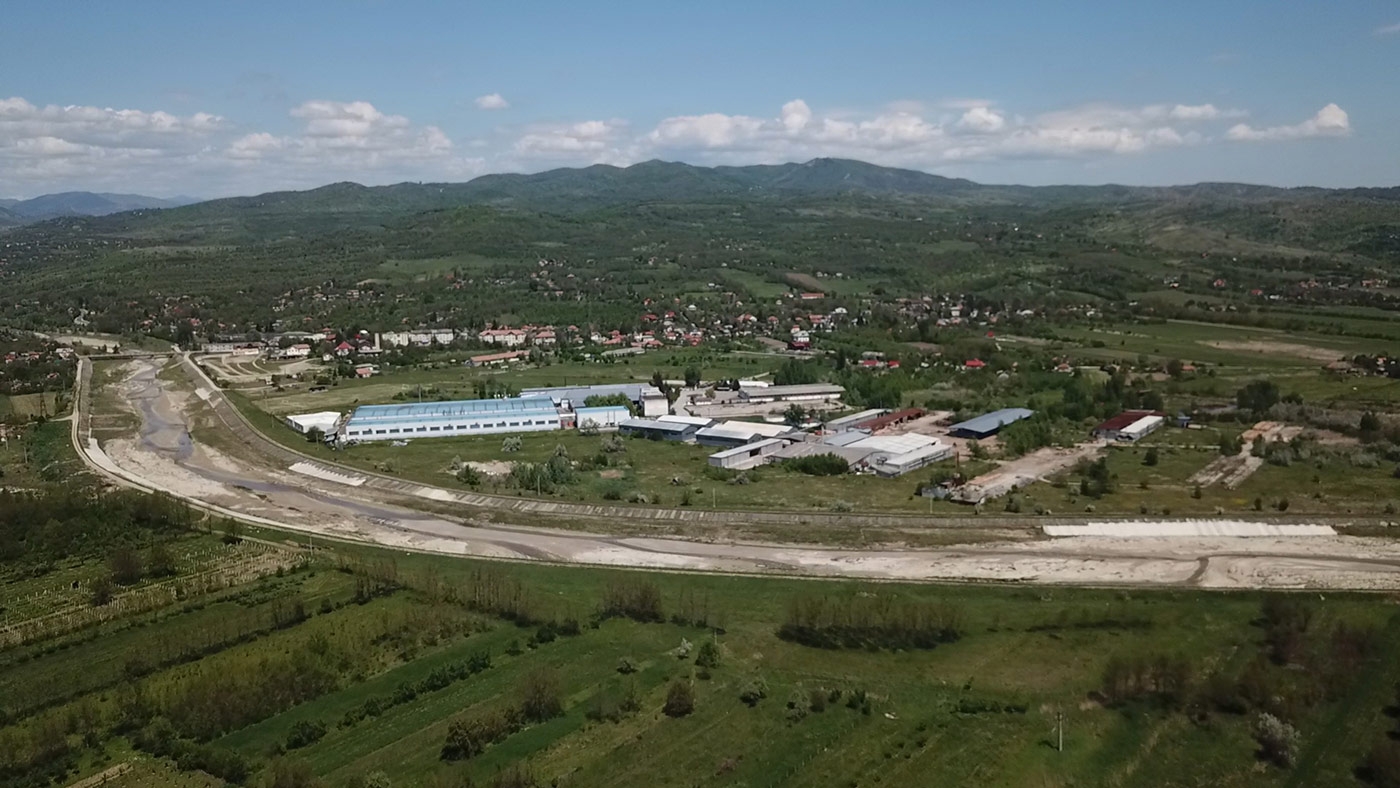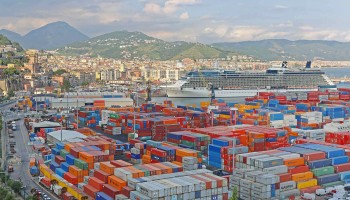Two smugglers and a China Tobacco executive were speeding through the streets of Naples in a VW Golf when they got a call that broke them into a panic.
They were on their way back from Salerno, a centuries-old seaport on Italy’s west coast, where they’d dropped off a container they hoped to send across the Mediterranean to Libya.
But unlike most of the cargo leaving Salerno, their shipment was loaded with over 17 tons of useless dead weight: bricks, mattresses, and old cardboard. The trio were conspirators in what Italian prosecutors later called an “ingenious” plan to smuggle tons of Chinese-made cigarettes into Europe and sell them on the black market.
On paper, a shipping container full of cigarettes would be exported to Libya through Salerno. Since they were supposedly just transiting through Italy, no excise tax would be paid. But in reality, the cigarettes would never leave European soil — only the container of junk would be sent to Libya.
Or at least that was the plan. Then, the driver’s cell phone rang. His son was on the other end of the line and the news was bad: Italian tax police were raiding the garage where they’d stashed the real cigarettes.
“We have problems,” he said urgently, according to a 2016 wiretap obtained by OCCRP. “It’s Guardia di Finanza at my place, asking for the documents of the container. Gimme all the documents, c’mon!”
“But how do they know?” asked the tobacco company official, a note of fright in her voice.
She had good reason to be worried. While her companions were experienced smugglers who had worked with the Camorra, a crime group with deep roots in Naples, she was a high-ranking executive at China Tobacco International Europe Company (CTIEC), the Romania-based subsidiary of the world’s biggest cigarette producer, China National Tobacco Corporation, often simply known as China Tobacco.
Now, here she was providing inside information and logistical support to serious organized crime.
The case provides the first public evidence that China Tobacco officials have engaged in cigarette smuggling, and links their operation to criminal groups active in Europe.
Europe is a key region for China Tobacco. Although the sprawling conglomerate controls almost half the global cigarette market, most are sold to China’s approximately 300 million smokers. China Tobacco is now expanding into new markets, and smuggling is a key strategy tobacco companies have often used to do that.
How Tobacco Companies Use Smuggling to Their Advantage
CTIEC wrote in an email to OCCRP that it had always followed the law, conducted due diligence, cooperated with customs authorities, and taken other measures to combat the illegal tobacco trade.
“As a Romania-based company, CTIEC is committed to comply with the laws and regulations in Romania as well as other countries where our business occurs,” the company said.
Adina Ionescu, the CTIEC executive, denied any involvement in the cigarette smuggling ring.
“I don’t speak Italian now and I did not speak Italian before. I did not know them,” she said.
But wiretaps, court documents, and a timeline of events pieced together by OCCRP tell a different story, with Italian prosecutors calling Ionescu a “central pawn” in a smuggling operation that stretched across Europe.
At the center of this network is a factory in rural Romania. Journalists discovered that the CTIEC-owned facility manufactures some of Europe’s most popular illicit brands, and has supplied companies tied to smugglers in a number of countries, including Italy.
A Romanian Hub
On the banks of a slow-moving river that rolls through forested hills north of Bucharest sits one of China’s biggest investments in Romania: a cigarette factory.
The unassuming building near the tiny agricultural town of Parscov has existed since early 2000 as a minor investment of a China Tobacco subsidiary. But starting in 2007, it was rebranded as China Tobacco International Europe Company (CTIEC) with the idea that the factory could serve as China’s main outpost for expanding cigarette sales into Europe. Since the early 2000s, China has invested over $40 million into the facility.
TobaccoChina Online, an industry publication that covers China Tobacco closely, described how CTIEC used this money, as well as “great promotion efforts” by China’s State Tobacco Monopoly Administration, to invest in new technologies and upgrade its production line.
“As a pioneer in the implementation of China Tobacco’s ‘Go Global’ strategy, China Tobacco International Europe has a world class ambition to strive to become a world leading brand,” CTIEC announced on its official company website.
By 2018 it was producing almost 2 billion cigarettes per year — ultra-cheap brands like Dubao, Dubliss, and D&B, as well as some of China Tobacco’s higher-end offerings, like Marble and Regina.
But despite CTIEC’s lofty ambitions, or perhaps because of them, a share of its output was finding its way to illegal markets.
Not long after the factory opened, local media in Romania’s northwest began featuring reports that its cigarettes were being moved by organized crime groups active along the country’s borders with Ukraine and Moldova.
Questions remain about exactly who’s behind the smuggling, and the involvement of CTIEC staff. But what’s clear is that Marble and Regina became some of Europe’s most smuggled brands in the years after China Tobacco decided to “go global.”
By 2016, Marble accounted for a third of Romania’s illicit cigarettes, a “spectacular evolution” that increased its share from 9.8 percent just three years earlier, according to a confidential report commissioned by four tobacco companies. Marble and Regina also became the leading brands in illegal markets across Europe between 2012 and 2016, the global accounting firm KPMG reported.
In Italy, Regina cigarettes quickly rose to become the single most smuggled brand in the country. By 2016, half of all seized black market cigarettes were Reginas.
Cosimo De Giorgi, head of customs for Italy’s Guardia di Finanza, said he believed the Regina brand was a “Trojan horse,” tailor-made to cultivate an Italian market for Chinese cigarettes.
“Just by calling the cigarette ‘Regina’ it makes the product more, let’s say, Italian sounding –– a name related to the Italian tradition, the Italian language,” he said.
The brand is widely smoked in Italy’s poorer regions, like the area around Naples, because it is cheaper than legal cigarettes, he added.
The Guardia di Finanza also suspects that smugglers are bringing China Tobacco packaging and raw materials for Regina cigarettes to Campania’s many illegal tobacco factories, where they can be produced and sold locally.
That way, “the state of China doesn't lose one single yuan in excise taxes, as those are paid to the country where the cigarettes are sold,” De Giorgi said. “On the other hand, China is promoting its products and paving the way for its market of cigarettes.”
Despite the large and growing number of cigarettes it produces in Europe, China Tobacco is difficult to monitor. It’s not a publicly traded company and isn’t obliged to release financial information — and it doesn’t. CTIEC’s official website has been offline for nearly a year.
In a 2018 report on tobacco smuggling in Romania, the chapter on CTIEC was nearly empty. “The anti-smuggling activities of the Romanian branch of CTI [China Tobacco International] could not be analyzed,” the report said. “The company did not respond to researchers' requests”.
However, OCCRP managed to obtain a decade’s worth of the company’s trade data.
The numbers show that many of the cigarettes produced in its Romanian factory were sold to companies in areas affected by war or civil unrest: Iraq, Syria, Libya, and Russian-occupied territories in Ukraine, Moldova, and Georgia.
All of these areas are notorious “black holes” for smuggled cigarettes, according to Luk Joossens, an international expert on the illicit tobacco trade.
CTIEC even sold directly to companies that have been implicated in smuggling, including Sheriff Corporation, which is owned by Viktor Gușan and Ilya Kazmaly, oligarchs who control much of the economy in Transnistria, a breakaway region of Moldova. Sheriff was accused in 2020 of smuggling huge amounts of cigarettes, which reportedly cost the government 60 million euros in lost taxes.
CTIEC also sold to New Eastern Management, a firm registered in Liberia that was exposed in a recent investigative report as a major smuggler of cigarettes out of Montenegro.
Three different Ukrainian companies that bought cigarettes from CTIEC are under investigation in their home country for tobacco smuggling, OCCRP and The Kyiv Post discovered.
“What they are doing now is really exactly the same as what tobacco companies have been doing over the last 25 years. [They are] exporting, saying ‘We don’t know where it’s going,’ and to countries which are too small” for the amount they receive, Joossens said.
Who are China Tobacco Europe’s customers around the world?
CTIEC denied any wrongdoing and said its shipments to countries in the Middle East and Europe were “justified based on the market demand.” However, it conceded that its own market share in these countries was currently “very low or insignificant.”
“CTIEC is continuously striving to improve our business practice regarding risk control measures,” it said, adding that it could not comment on allegations against its customers.
The Naples Caper
CTIEC said it fired Adina Ionescu as soon as it found out about her alleged role in the plot to smuggle cigarettes into Italy using a cloned shipping container. But wiretaps by Italian police suggest that it was not her first time working with the crew of eight Moldovans and Italians, some with links to the Camorra crime group.
“The contact is always the same: Adina. She knows the customs procedures,” one of them said.
In another conversation, a Moldovan named Vasile Vieru discussed the role of CTIEC and its state-owned parent company, China Tobacco.
“The money is paid to the Chinese state…. Do you understand? The factory, it’s owned by the Chinese state…. Do you understand?” he explained to Raffaele Truglio, who handled transportation of the cigarettes and helped arrange use of the warehouse in Naples where they were stored.
“Salvatore leaves our percentage [cut] and makes the payment to the Chinese factory…. Once the money arrives there, the goods … will be sent to Libya. Radwan needs to take the goods and close our documents.”
Italian investigators never identified the person they referred to in transcripts of the wiretaps as “Radwan” or “Raduan.” But journalists discovered that he was likely Rodwan Omar Ahmed Elmagrebi, a businessman in Italy who transports cargo to his native Libya.
Two months before police busted the crew with their cloned container, "Radwan" himself was caught on the wiretap, speaking with Truglio about moving some unidentified products.
Elmagrebi told OCCRP he had nothing to do with the smuggling plot, although he was mentioned in wiretaps as someone who could help handle a container of cigarettes the group sent to Libya.
In July 2016, after two aborted attempts to put the plan into action, the group booked passage for a container on the Messina Line, one of the biggest freight companies serving the Mediterranean. Then they bought an old container of the same size, painted it the distinctive shade of orange used by Messina, and added the same identification number as the real one.
After the paint job, the fake was sent to China Tobacco’s factory north of Bucharest to be loaded up with 8.9 million cigarettes the smugglers had bought for $66,200, or $0.15 a pack This was almost four times less than the same brands retailed for in Romania. In Italy, the price was even higher — between 2 and 3 euros a pack on the black market, according to local media. That means selling the entire load could net the smugglers a profit of around $1 million.
The cigarettes were driven back to Italy, where Ionescu was waiting for them in a warehouse used by Truglio. Nearby, the identical container had been filled with bricks, cardboard and old mattresses weighing the exact same amount.
The moment the cigarettes arrived in Italy, Ionescu and three other smugglers sped to the harbor with their container full of junk. They hoped to get it out to sea before anyone realized there were two containers in Italy sharing the same ID.
Unfortunately for the smugglers, Italian police had been tracking their moves. Authorities closed in not long after they pulled their container of illegal smokes into Truglio’s warehouse.
“The one with the mattresses [to be] sent to Libya, we had it confiscated in Salerno in the port as it was leaving,” explained Lieutenant Dionigi Orfello, the Guardia di Finanza official who led the operation. “And another had cigarettes. We seized it from the companies of Truglio in Naples.”
The smugglers were furious — especially at Ionescu, whom they felt had guaranteed the caper would work out.
“I will make her pay... I will cut her head off!” one of them fumed.
Truglio is now in jail awaiting the next phase of his trial, according to Italian prosecutors, while other members of the smuggling ring were arrested in Italy or Moldova for either cigarette smuggling or other crimes, and one was acquitted.
Two of the Italians who were arrested for drug trafficking had been working with the Camorra, according to Maria Di Mauro, the prosecutor in charge of the case. So had Moldovan Vasile Vieru.
He was “a very criminally equipped subject,” said Di Mauro. “He moved very smoothly, and also had connections with the local Neapolitan criminality.”
Ionescu was extradited from Romania to Italy, where she spent several months in jail.
“I screamed in court, ‘Don’t extradite me, I don’t have anything to do with these people!’” she said in a phone interview. “And they answered, ‘We have treaties, and we need to extradite you.’”
“I've suffered," added Ionescu, who is now back in her homeland and free.
Red Flags
CTIEC claimed Truglio stole the shipment of cigarettes, Lt. Orfello said. The company even filed a criminal complaint against him.
However, several aspects of the case suggest that CTIEC knew — or should have known — that the cigarettes were destined for the black market.
For one thing, the Libyan company set to receive the goods, Al Emteyaz, was based in the port city of Misurata, a major smuggling hub even before it was devastated by heavy fighting in the civil war that followed the overthrow of Muammar al-Qaddafi in 2011.
“Libya has almost no taxes on cigarettes and a huge [smuggling] problem — all the traffic for Africa, it goes through Niger and Libya,” said Joossens, the tobacco expert.
In 2016 alone, CTIEC reported that it sent over 350 million cigarettes in 33 separate shipments to Al Emteyaz. Reporters were unable to find the company’s address or contact information to ask for comment.
An even bigger red flag was Devmak, an Iraqi company that had purchased the cigarettes and would deliver them to Al Emteyaz –– at least according to the paper trail.
Devmak was a major customer of the CTIEC factory, customs documents show. It bought up almost a third of CTIEC’s entire output from 2014 to 2020, spending $20 million on 2.6 billion Regina, Dubao, and D&B cigarettes.
It’s unclear whether all the cigarettes listed as purchased by Devmak actually found their way to Iraq, or whether some or all were diverted. But Joossens, the international tobacco control expert, said the sheer volume sent to Iraq was suspicious.
“If Romania produces Chinese brands and exports billions to Iraq and nobody buys Chinese brands in Iraq, then there is a problem,” he said.
And for a company supposedly buying so much tobacco, Devmak keeps a very low profile. OCCRP reporters spent several months trying to track down evidence that it even exists legally.
It’s registered in Duhok, a northern city in Iraqi Kurdistan, which is a well-known hub for cigarette smuggling. But the company does not appear on the nameplate in the lobby of the building where it lists its address.
Several people interviewed at the building said they had never heard of Devmak. Iraq’s General Directory for Company Registration did not reply to a request for information about the firm.
But official traces of Devmak did turn up in an unlikely location: After the cigarettes were confiscated in Naples, investigators raided Ionescu’s apartment back in Romania. Inside, they found the company stamp.
These stamps are used to validate documents and should never leave the possession of a company’s administrators, according to a Romanian tax expert briefed on the case. He called it “a very strange situation, one that does not follow the financial rules.”
The discovery suggests that Devmak was used as a corporate vehicle to smuggle CTIEC cigarettes. CTIEC would not comment on the stamp or on Devmak’s huge orders of cigarettes, citing customer confidentiality.
When asked why a Devmak stamp was found in her home, Ionescu hung up the phone.













